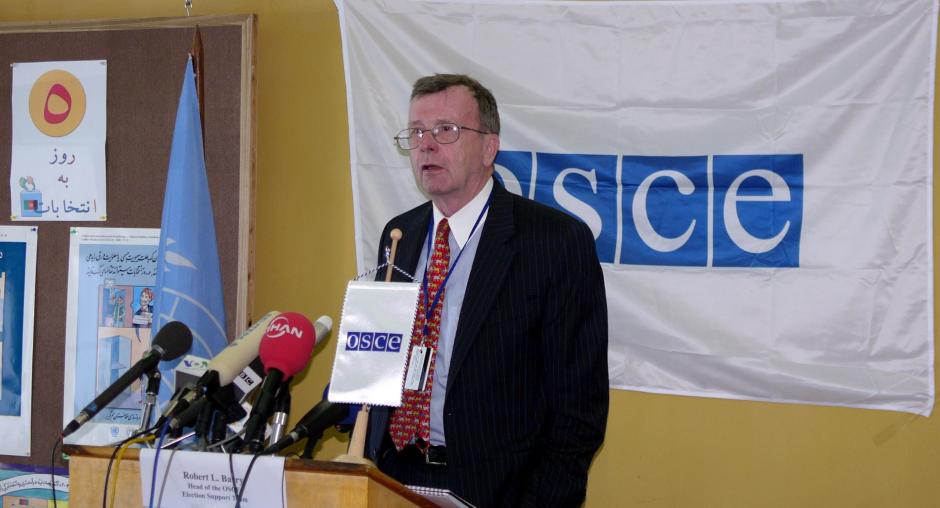Newsroom
No concern over secrecy of vote in Afghan presidential election - OSCE Election Support Team chief
KABUL 4 October 2004

(OSCE/Alexander Nitzsche)Ambassador Robert Barry, head of the OSCE Election Support Team to Afghanistan, briefs journalists in Kabul, 4 October 2004. (OSCE/Alexander Nitzsche) Photo details
KABUL, 4 October 2004 - The system to guarantee the secrecy of the vote in the 9 October presidential election in Afghanistan is near to foolproof, Ambassador Robert Barry, Head of the OSCE Election Support Team, said at a press conference today.
"There have been a lot of comments from candidates that the vote of the Afghan electorate won't be secret next Saturday. We don't believe this is true," he said.
"There is a very elaborate system to protect the secrecy of the vote. The counting, for instance, will not be done locally or regionally, but in centralized voting centres, where all ballots will be mixed together so that individual votes cannot be identified anymore. This method is close to foolproof."
Ambassador Barry said that the behaviour of candidate agents as observers on election day was a potential issue of concern.
"The laws and regulations governing the conduct of agents and observers are very clear," he said. "They are not permitted to engage in campaign activities or to pressurize voters. If there are violations of these regulations, we trust that action will be taken by the electoral bodies."
In total, 14 international OSCE teams are currently being deployed to Kabul, the seven other regional centres and three provinces. Their role is to analyze the election preparations and the polls on election day.
"On the basis of their findings, we will put together a set of recommendations that will be given to the Afghan Government and the electoral administration in order to assist them with the holding of future elections," Ambassador Barry said.
This is the first time that the OSCE is involved in elections in a country that is not one of its 55 participating States. Afghanistan has, however, been an OSCE Partner for Co-operation since 2003.
"There have been a lot of comments from candidates that the vote of the Afghan electorate won't be secret next Saturday. We don't believe this is true," he said.
"There is a very elaborate system to protect the secrecy of the vote. The counting, for instance, will not be done locally or regionally, but in centralized voting centres, where all ballots will be mixed together so that individual votes cannot be identified anymore. This method is close to foolproof."
Ambassador Barry said that the behaviour of candidate agents as observers on election day was a potential issue of concern.
"The laws and regulations governing the conduct of agents and observers are very clear," he said. "They are not permitted to engage in campaign activities or to pressurize voters. If there are violations of these regulations, we trust that action will be taken by the electoral bodies."
In total, 14 international OSCE teams are currently being deployed to Kabul, the seven other regional centres and three provinces. Their role is to analyze the election preparations and the polls on election day.
"On the basis of their findings, we will put together a set of recommendations that will be given to the Afghan Government and the electoral administration in order to assist them with the holding of future elections," Ambassador Barry said.
This is the first time that the OSCE is involved in elections in a country that is not one of its 55 participating States. Afghanistan has, however, been an OSCE Partner for Co-operation since 2003.
